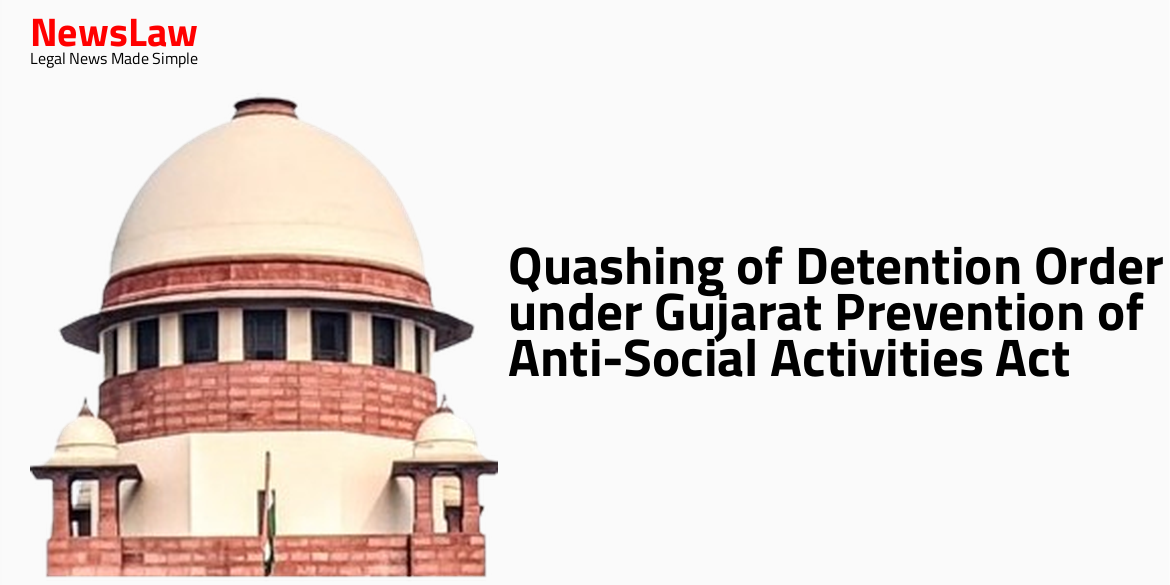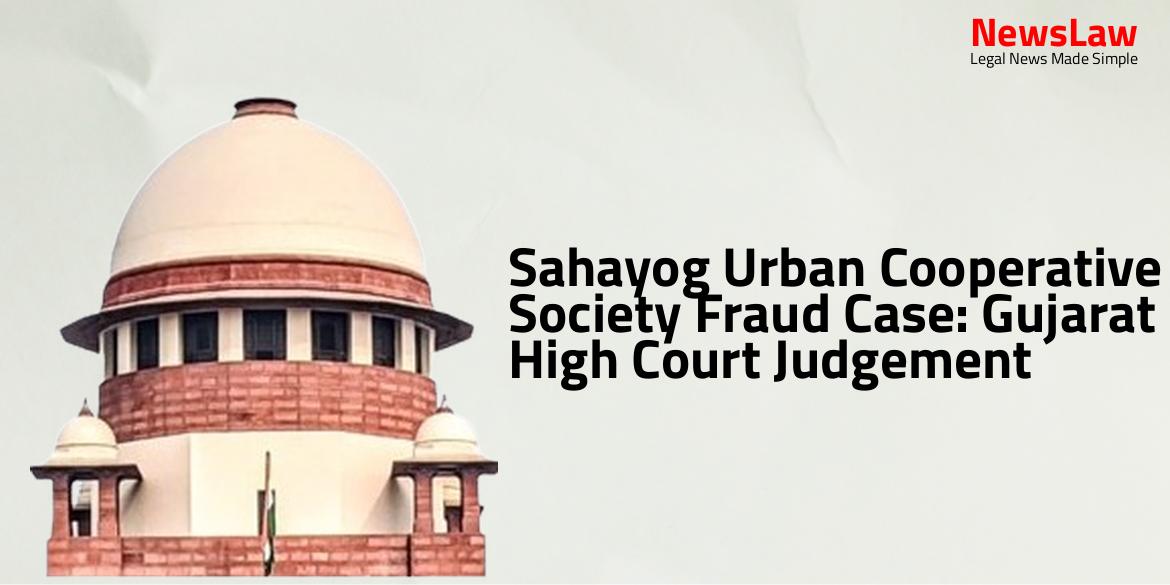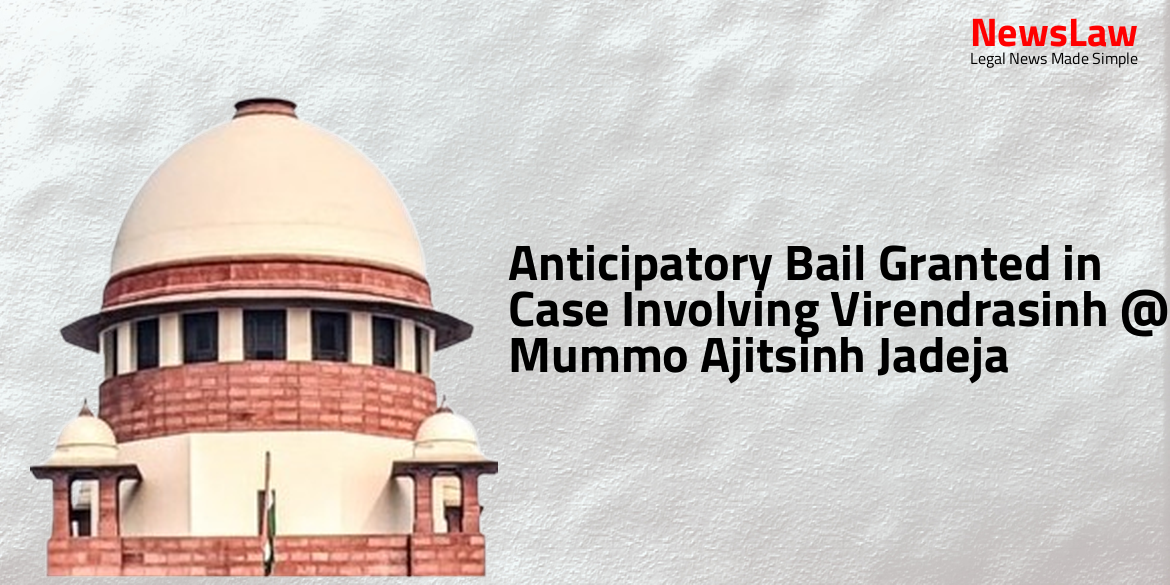In a significant ruling, the Gujarat High Court has quashed the detention order dated 25.1.2024 passed under the Gujarat Prevention of Anti-Social Activities Act. The case involved the detaining authority invoking Section 3(1) of the Act against the petitioner-detainee. The Court deliberated on the key aspects of preventive detention, the threshold for disturbing public order, and the necessity for substantial evidence to justify such detention. The judgment reflects the court’s emphasis on safeguarding personal liberty while maintaining the delicate balance between law and order and public order.
Facts
- The present petition challenges the order of detention dated 25.1.2024 passed by the detaining authority under the Gujarat Prevention of Anti-Social Activities Act, 1985.
- The detaining authority invoked powers under Section 3(1) of the Act to detain the petitioner.
- The petitioner has been defined as a detenue under Section 2(c) of the Act.
Arguments
- The advocate for the petitioner argues that the activities of the petitioner-detainee in criminal cases did not disturb the social fabric or pose a threat to society.
- The advocate emphasizes that the petitioner-detainee’s actions do not constitute a breach of public order but rather a breach of law and order.
- There is a lack of substantial evidence apart from witness statements and FIRs to prove that the petitioner-detainee’s activities disrupt public order.
- The advocate contends that the detention order was solely based on the registration of FIRs and does not consider the petitioner-detainee being on bail for all offenses.
- The advocate urges for the quashing of the detention order as it lacks sufficient justification beyond the registration of FIRs.
- The detaining authority’s subjective satisfaction is found to be illegal and not in accordance with law.
- The alleged offenses in the FIRs do not pertain to public order as required by the Act.
- Other relevant penal laws are considered sufficient to address the situation.
- The allegations against the detenue are not relevant for the purpose of Section 2(c) of the Act.
- For a person to be detained under the Act, there must be substantial material showing a threat to public order affecting the whole society.
- The detenue’s actions do not fit the definition of Section 2(c) of the Act.
- The AGP for the State supports the detention order and claims that sufficient evidence was found during investigation to justify the detenue’s detention.
Analysis
- Preventive detention involves detaining a person without trial to prevent them from committing certain offenses.
- Preventive detention cannot be used to keep a person in perpetual custody without trial.
- A District Magistrate can take action to prevent subversion of public order but not in aid of maintenance of law and order under normal circumstances.
- Article 22 must be viewed as an exception to Article 21 and can only apply in rare and exceptional cases.
- The offenses alleged in the case are punishable under the Andhra Pradesh Prohibition Act.
- There is a lack of specific material showing the detenue’s actions as dangerous to public order.
- The powers of preventive detention are exceptional and draconian.
- The distinction between disturbance to ‘law and order’ and disturbance to ‘public order’ has been settled by a Constitution Bench in the case of Dr. Ram Manohar Lohia vs. State of Bihar.
- Every disorder does not meet the threshold of disturbance to public order unless it affects the community at large.
- Disturbances that subvert public order are necessary for action under the Defence of India Act.
- Acts of assault or injury to specific persons do not necessarily lead to public disorder.
- Preventive detention laws should not be used as a substitute for ordinary criminal law.
- Preventive detention involves detaining a person without trial to prevent certain types of offenses, but should not absolve investigating authorities of their duties under normal law enforcement processes.
- Apprehension of a breach of law and order is not sufficient to meet the standard of adversely affecting the maintenance of public order.
- The State has powers to curb rights under criminal laws and preventive detention laws, but these powers must be exercised with caution and a proper appreciation of the facts.
- The distinction between ‘law and order’ and ‘public order’ has been clearly laid down by the Apex Court in various cases.
- Personal liberty protected under Article 21 is sacrosanct and high in the scale of constitutional values.
- Detaining authority must show that the detention complies with the procedure established by law.
- Registration of FIRs alone cannot be used to justify invoking the power under Section 3(1) of the Act.
- Lack of relevant and cogent material for invoking the power under the Act.
- The impugned order of detention dated 25.1.2024 is quashed and set aside.
- Detenue ordered to be set at liberty forthwith if not required in any other case.
- Rule made absolute to the aforesaid extent.
Decision
- The court found that the actions of Original Name 1 were in line with the regulations set out in the RPC.
- The court emphasized the importance of adhering to the guidelines and standards outlined in the RPC.
- Original Name 1 was found to have followed due process and acted within the parameters of the RPC.
- The court ruled in favor of Original Name 1 based on their compliance with the RPC.
Case Title: ALTAF MAHEBUBBHAI MOVAR Vs. COMMISSIONER OF POLICE
Case Number: R/SCA/2751/2024



